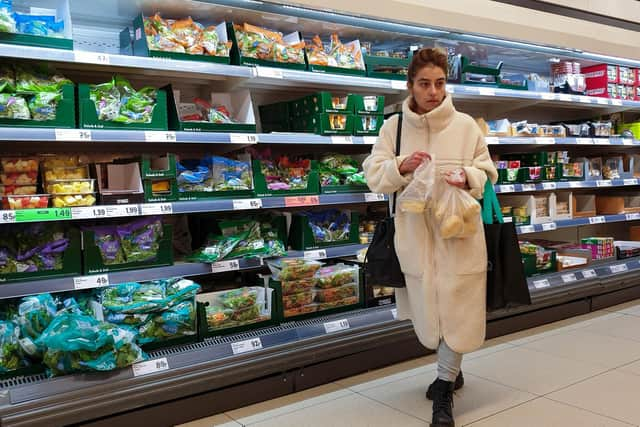Households’ financial wellbeing ‘at lowest point in two years’
The Scottish Widows index, which measures households’ overall perceptions of financial wellbeing, fell to an overall score of 38.5 the first three months of 2022.
Readings above 50 in the index indicate an improvement and those below this mark are a sign of a deterioration.
Advertisement
Hide AdAdvertisement
Hide AdThe latest score is the lowest recorded by the index since early on in the coronavirus pandemic in the second quarter of 2020, when the score was 37.8.


It comes as the Prime Minister defends the decision to hike up national insurance for millions of workers, arguing that the manifesto-breaking rise is “necessary, fair and responsible”.
From today, national insurance contributions will increase by 1.25 percentage points.
From April 2023 onwards, the NI rate will decrease back to the 2021-22 level, with a new 1.25 per cent health and social care levy legally introduced.
The UK Government predicts that the tax rise will raise £39 billion over the next three years to help reduce the Covid-induced NHS backlog and later reform adult social care for the long-term.
In the Scottish Widows study, of the 40 per cent of households who said they have accumulated additional savings since the Covid-19 pandemic started, nearly three-quarters (73 per cent) expect to have to dip into them in the next 12 months, with 17 per cent expecting to exhaust the full amount.
Rising energy, food, council tax, transport, rent and mortgage bills and a 1.25 percentage point national insurance hike to help pay for health and social care will eat into household incomes.
Emma Watkins, managing director of retirement and longstanding at Scottish Widows, said: “It’s tough right now for households trying to manage the surge in day-to-day living costs.
Advertisement
Hide AdAdvertisement
Hide Ad“We know that many households have failed to boost their savings during the pandemic (60 per cent) and that over 70 per cent of households will need to eat into their savings in the next 12 months in order to meet their growing expenses.”
Data pointed to a rapid decline in the amount of cash UK households had available to spend during the first quarter of the year as higher living expenses bit into disposable income, the report said.
The rate of reduction in cash available was the fastest since the final quarter of 2013, Scottish Widows said.
It added that, in general, the highest earners were the only group able to add to their savings pots during the latest quarter.
At the same time, there was a fractionally stronger demand for unsecured credit, such as overdrafts and credit cards in the first quarter of 2022, according to the index.
People aged between 25 and 54 reported the strongest rise in demand for credit.
Around 10 per cent of those surveyed said they have taken out life insurance since the start of the pandemic, while around 60 per cent of households surveyed do not have any. K.
Comments
Want to join the conversation? Please or to comment on this article.